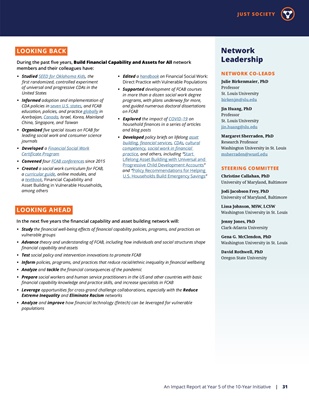
JUST SOCIETY
Network
Leadership
NETWORK CO-LEADS
Julie Birkenmaier, PhD
Professor
St. Louis University
birkenjm@slu.edu
Jin Huang, PhD
Professor
St. Louis University
jin.huang@slu.edu
Margaret Sherraden, PhD
Research Professor
Washington University in St. Louis
msherraden@wustl.edu
STEERING COMMITTEE
Christine Callahan, PhD
University of Maryland, Baltimore
Jodi Jacobson Frey, PhD
University of Maryland, Baltimore
Lissa Johnson, MSW, LCSW
Washington University in St. Louis
Jenny Jones, PhD
Clark-Atlanta University
Gena G. McClendon, PhD
Washington University in St. Louis
David Rothwell, PhD
Oregon State University
LOOKING BACK
During the past five years, Build Financial Capability and Assets for All network
members and their colleagues have:
• Studied SEED for Oklahoma Kids, the
first randomized, controlled experiment
of universal and progressive CDAs in the
United States
• Informed adoption and implementation of
CDA policies in seven U.S. states, and FCAB
education, policies, and practice globally in
Azerbaijan, Canada, Israel, Korea, Mainland
China, Singapore, and Taiwan
• Organized five special issues on FCAB for
leading social work and consumer science
journals
• Developed a Financial Social Work
Certificate Program
• Convened four FCAB conferences since 2015
• Created a social work curriculum for FCAB,
a curricular guide, online modules, and
a textbook, Financial Capability and
Asset Building in Vulnerable Households,
among others
• Edited a handbook on Financial Social Work:
Direct Practice with Vulnerable Populations
• Supported development of FCAB courses
in more than a dozen social work degree
programs, with plans underway for more,
and guided numerous doctoral dissertations
on FCAB
• Explored the impact of COVID -19 on
household finances in a series of articles
and blog posts
• Developed policy briefs on lifelong asset
building, financial services, CDAs, cultural
competency, social work in financial
practice, and others, including "Start
Lifelong Asset Building with Universal and
Progressive Child Development Accounts"
and "Policy Recommendations for Helping
U.S. Households Build Emergency Savings"
LOOKING AHEAD
In the next five years the financial capability and asset building network will:
• Study the financial well-being effects of financial capability policies, programs, and practices on
vulnerable groups
• Advance theory and understanding of FCAB, including how individuals and social structures shape
financial capability and assets
• Test social policy and intervention innovations to promote FCAB
• Inform policies, programs, and practices that reduce racial/ethnic inequality in financial wellbeing
• Analyze and tackle the financial consequences of the pandemic
• Prepare social workers and human service practitioners in the US and other countries with basic
financial capability knowledge and practice skills, and increase specialists in FCAB
• Leverage opportunities for cross-grand challenge collaborations, especially with the Reduce
Extreme Inequality and Eliminate Racism networks
• Analyze and improve how financial technology (fintech) can be leveraged for vulnerable
populations
An Impact Report at Year 5 of the 10-Year Initiative | 31